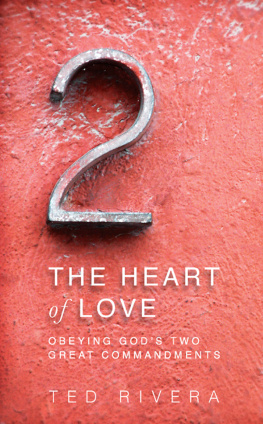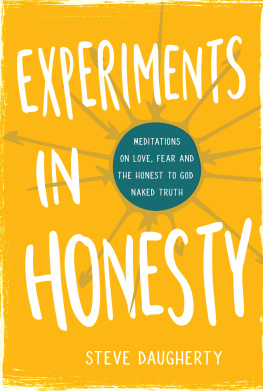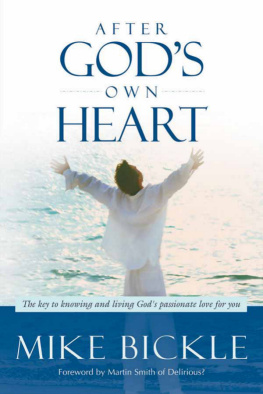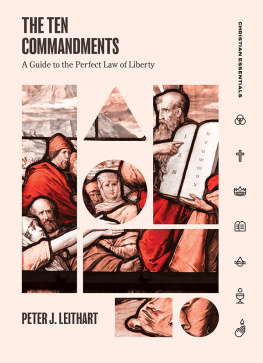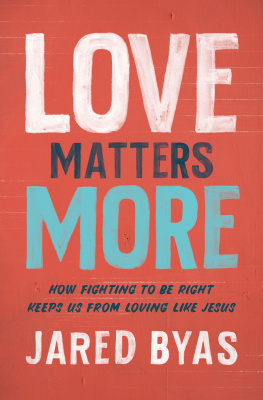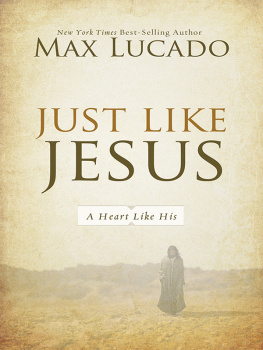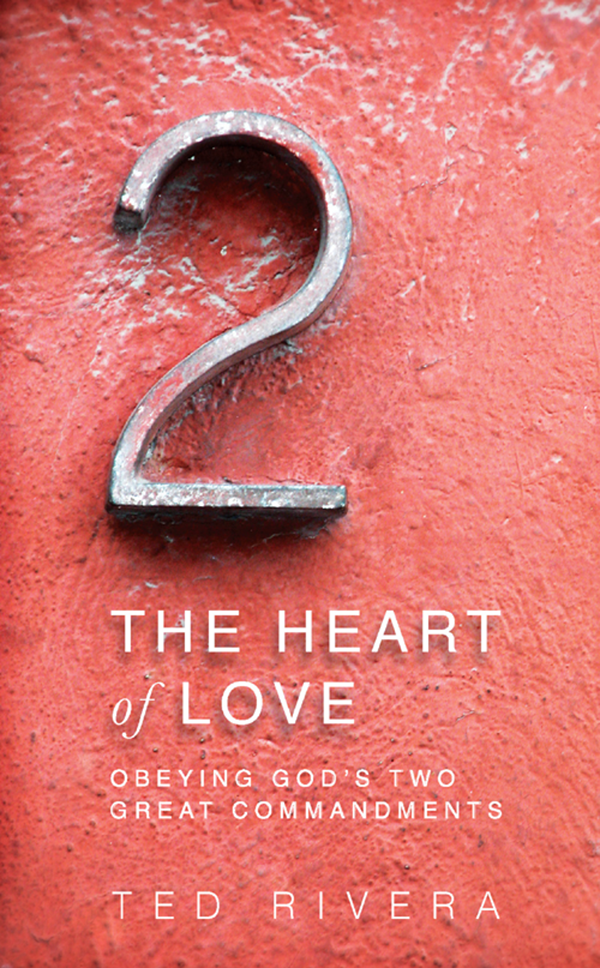May you always see Gods two great commandments as both a calling and a joy.
W HAT DOES G OD WANT FROM MY LIFE ? There are hundreds of commandments in the Bible, along with so much wisdom, that it seems impossible to process all this information. Some of the guidance in Scripture applies to major matters (e.g., You shall not murder, Exod 20:13) and some to comparatively minor ones (A gossip betrays a confidence, but a trustworthy person keeps a secret, Prov 11:13). Because of this, its not surprising that Christians sometimes struggle to understand how best to live their lives. There are 1,189 chapters in the Bible. How do we make sense of it all? Whats most important? We look to the churches we are a part of, to our pastors, and to other Christians to help us process and distill all of this information, but even then it can be hard to know whats best.
Happily, as surprising as it may seem, its not hard to know whats most pleasing to God and, as a result, how we should be living. Jesus clearly explained this for us. One day, an expert in the law came to Jesus in order to test him and asked, Teacher, which is the greatest commandment in the Law? (Matt 22:36). Now, this sounds like a bad idea, doesnt it? Does it seem wise to test Jesus? Jesus, the beloved Son of God? Jesus, who was God incarnate? But rather than rebuke the man, Jesus took time to answer his question and, in doing so, gave us the essential starting point we need as we seek to understand how best to live the Christian life: Jesus replied: Love the Lord your God with all your heart and with all your soul and with all your mind. This is the first and greatest commandment. And the second is like it: Love your neighbor as yourself. All the Law and the Prophets hang on these two commandments (Matt 22:37 40).
In these few words, Jesus provides us with the key insight we need into how to understand the whole of the Bible and, as a result, how we should live a life that will be pleasing to our God. He teaches us that all the Law and the Prophets hang on these two commandments. In other words, everything we find in the whole of Scripture can be shown to relate to these two commandments, as if the whole of Scripture could be pictured as two great trees with many branches and many more glorious leaves.
This realization leads us toward something we may have never known before. It is possible to obtain clear, trustworthy, divine direction and to develop a true heart of love. We can know with confidence how to lead lives that are pleasing to God. Both tremendous freedom and peace of mind come from knowing that the choices we make as Christians can be tested and found to be wise, and that we can have filters for our day-to-day decision-making that are based on biblical truth.
Unfortunately, too many Christians live each day making decisions that are disconnected from the fountain of the wisdom of Scripture. Thus, our goal is to consider carefully the two great commandments that Jesus points us to, and in doing so, we can understand not simply how to make good choices in our lives but the best ones. And lets be honestthis may keep us from making bad choices as well. Two great commandments. The greatest of commandments. What can we learn?
As we plunge into this study, let me set before you a challenge that will underscore for us the seriousness of what it is that we are about to undertake. You may have heard how the obituaries of famous people are sometimes written years before their death. In this way, as soon as they die, they can be mildly edited and published. This may seem a bit grim. But think about obituaries and the kind of information they contain. They typically report such matters as whom the deceased was related to, where he attended school, what she did for a living, and what he was most interested in. Every day, you and I are, in effect, writing our own obituaries. Are you satisfied with what you have accomplished in this life thus far?
But lets not stop there. We might be too quick to congratulate ourselves on our own accomplishments. As we consider our lives, we must strive to come to the end with as few regrets as possible. Can you imagine someone coming to the end of his life and saying, Oh, if only I had watched more television! Or, Oh, if only I had mastered one more video game! Or, Oh, my life would have really mattered to others if I had been able to attend just one more sporting event! But if our obituaries really expressed what was most often in our hearts, perhaps some of these things, or others like them, would appear.
Loving God and loving other people: now that seems like a life worth living. But this will only happen by deliberate action on our part. Our lives will ultimately be a success or a failure based on the choices we make every day. A couple of years ago, I lost ninety pounds. I can tell you that I had to make thousands of choices through the year it took me to lose that weight, and in the years that followed, thousands more choices to keep it off. Spiritually speaking, we could likely use a diet even more; Id rather be the fattest person in heaven than the fittest person in hell. And so the seriousness of this task is now in view, and as the poet put it, Only one life, twill soon be past, Only whats done for Christ will last.
T AKE A MOMENT AND THINK about the most glorious wedding you have ever attended. It may have been your own wedding or the wedding of a friend or loved one; it may have taken place near your home or in a far-off place. But for a moment, allow your mind to wander back to that event. There may have been flowers and music; the bride and groom may have been bedecked in spectacular array. In some cultures, perhaps a horse-drawn carriage or expensive limousine transported the happy couple after the ceremony. Maybe the sun was shining. On that most perfect day, love was surely in the air. But add to this one other thought: Is a marriage the same thing as a wedding? Hardly! There are dirty dishes, and poopy diapers, and even arguments over things that ultimately are of little or no consequence.
The word love has been watered down in our day. Happily, the Bible removes any mystery about the real meaning of this term and helps us soberly understand what love for God looks like. Jesus said plainly, If you love me, you will keep my commandments (John 14:15 ESV). By doing what God wants, we demonstrate our love to him not with words or speech but with actions and in truth (1 John 3:18).
In the gospel of Luke, Jesus paints a picture of what it is that a disciple will look like. It is a picture that serves as an excellent starting point, but also a terrific warning. If were being honest with ourselves and with one another, at many points we may well be tempted to turn back. A disciple is ultimately a humble follower, someone who wants Gods will to be done on earth in the same way it is done in heaven. And Jesus set this terrific test before us, to help us determine if we are on the right path: If anyone comes to me and does not hate father and mother, wife and children, brothers and sisters yes, even their own life such a person cannot be my disciple. And whoever does not carry their cross and follow me cannot be my disciple (Luke 14:26 27). In this short passage, we learn three potent truths.

